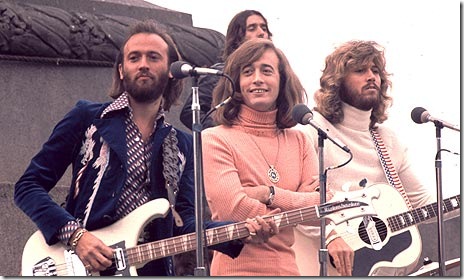 "Mi piacerebbe vedere Odessa presentato come un musical, basato sull'intero album. Mi piacerebbe farlo con Robin, con un'intera orchestra e magari con altri artisti. Preferirei fare questo, al posto di tentare un altro greatest hits dei Bee Gees"
"Mi piacerebbe vedere Odessa presentato come un musical, basato sull'intero album. Mi piacerebbe farlo con Robin, con un'intera orchestra e magari con altri artisti. Preferirei fare questo, al posto di tentare un altro greatest hits dei Bee Gees"
E' uno dei passaggi più interessanti di un'intervista telefonica concessa da Barry Gibb al quotidiano inglese "The Guardian" in occasione dell'uscita della ristampa di "Odessa".
"Spero di essere in grado di trovare un livello per fare uscire fuori queste idee con Robin. Non parliamo molto. Sarò in Inghilterra a Luglio, ci vedremo e gli parlerò di Odessa".
Nell'intervista Barry cerca di spiegare con le numerose e diverse influenze musicali "subite" dai Gibb le stranezze compositive di Odessa, doppio album che nel 1969 non riuscì a confermare i grandi successi dei precedenti album, sebbene il singolo "First of May" ebbe un buon successo commerciale.
Barry rivela che alla fine degli anni 90 i Bee Gees avrebbero voluto suonare interamente Odessa alla Royal Albert Hall di Londra, anche perchè l'album subì una grande rivalutazione da parte della critica musicale. Come si vede da quanto dichiara Barry la cosa non è del tutto accantonata, e potrebbe rappresentare un degno tributo alla memoria di Maurice Gibb.
(Fonte: Guardian)
The Bee Gee's Odessa file
On the phone from his Florida home, Barry Gibb is racking his brain. "I think Odessa was an attempt to do a rock opera," he offers. "It sort of turned itself into a bit of a mish mash, but our intentions were honourable. I think we wanted to do something that could be put on stage. There was supposed to be a thematic thing going on," he adds, "but it just kind of wandered off into the distance."
The eldest Bee Gee rarely speaks to the press these days: a prickly reputation precedes him. But discussing the Gibb brothers' remarkable 1969 concept album, Odessa – forgotten in the wake of their disco reinvention; recently reissued as a sumptuous three-CD box set – he turns out to be a hugely amiable, witty, self-deprecating raconteur, if understandably a little foggy on the exact details: "It was 40 years ago," he protests more than once.
Gibb might be forgiven for having blotted the whole Odessa experience from is memory. It was begun in the midst of an American tour abandoned owing to poor ticket sales, despite the band's success in the US ("We'd had a lot of hits but no live status," he says; "We weren't exactly Led Zeppelin, were we?"), and completed amid such acrimony that Robin left the band weeks after its release. Then the album flopped, plunging the band into further turmoil. "For four years we couldn't get arrested," says Gibb, of a period during which the band split up, reformed and found themselves reduced to playing supper clubs. "It was a really, really disturbing time when we knew we were good, but no one wanted to listen." He laughs. "Funnily enough, we've had a few of those."
Perhaps the public's muted response to Odessa is unsurprising. The Bee Gees were a weird band even by the standards of the late 60s. Their output zigzagged wildly between intense ballads destined to become standards – Words, To Love Somebody, I've Gotta Get a Message to You – and baroque pop-psychedelia with imponderable lyrics about racing drivers and fridges. But no record encapsulated the Gibb brothers' majestically skewed pop vision like Odessa, which amid the usual gorgeously orchestrated heartbreak, featured mock national anthems, country and western and a title track that set a new benchmark for their magnificent oddness: harps, flamenco guitars, mock-Gregorian chanting, a burst of Baa Baa Black Sheep, lyrics about icebergs and vicars and emigrating to Finland. Quite what Odessa's concept was supposed to be remains a mystery, but it's the kind of album you listen to rapt, baffled as to what's going to happen next.
Gibb thinks Odessa's weirdness had less to do with the era's psychedelic excesses than the peculiarities of the brothers' upbringing. "Our music became so speckled because we had all these insane influences from growing up in Australia – Col Joye and the Joy Boys, Billy Thorpe & the Aztecs, it was a pop scene unto itself. Then we were five weeks at sea going to Australia, five weeks at sea coming back. We'd been inside the pyramids, been to India, up the Suez Canal, in the Sahara Desert.
"By the time we arrived back in England, we'd had all these unusual cultural influences pounded into us. I really think that has a lot to do with our songwriting, these strange songs, unusual lyrics and abstractions."
In the late 90s, buoyed by the album's critical re-evaluation, the Bee Gees mooted a plan to play Odessa in its entirety at the Royal Albert Hall. Most people assumed that idea was quietly shelved after Maurice Gibb's death in 2003, but apparently not. "I'd love to see it presented as an actual musical, played through as an album. I would love to do it with Robin, with a full orchestra, maybe with other artists. I would rather do that than try to do the Bee Gees greatest hits again.
"I'd like to be able to find a level of knocking these thoughts out with Robin," he says, suddenly sounding a bit wistful: the surviving brothers' relationship apparently remains as fractious discuss these things. We don't speak very much." Then he perks up. "I'm coming to England in July, actually. I'll see him then. I'll get him by the lapels and talk about Odessa."
(Source: Guardian)